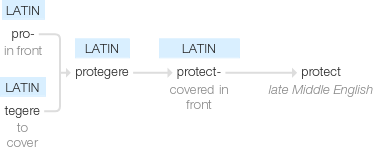Protect
late Middle English: from Latin protect- ‘covered in front’, from the verb protegere, from pro- ‘in front’ + tegere ‘to cover’.
wiktionary
Attested in English since 1530, from Latin prōtēctus(“covered, protected”), past participle of prōtegere(“to cover the front, protect”) from prō, prō-(“before, in front of”) + tegere(“to cover”), see tegument. Displaced native Middle English shelden, from Old English sċildan (”to protect,” literally ”to shield”).
etymonline
protect (v.)
"cover or shield from danger, harm, damage, exposure, trespass, temptation, insult, etc.," early 15c., protecten, from Latin protectus, past participle of protegere "to protect, defend, cover over, cover in front" (source also of French protéger, Old French protecter, Spanish proteger). This is from pro "before" (from PIE root *per- (1) "forward," hence "in front of, before") + tegere "to cover" (from PIE root *(s)teg- "to cover").
Applied with a wide range, both literal and figurative. The sense in political economy, "guard or strengthen against foreign competition by means of tariffs, etc.," is by 1789. Related: Protected; protecting.
